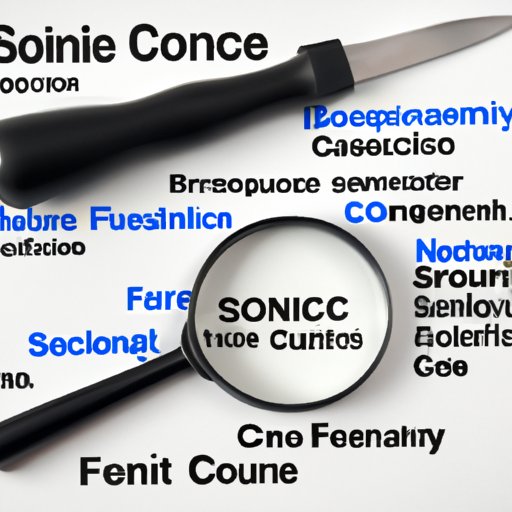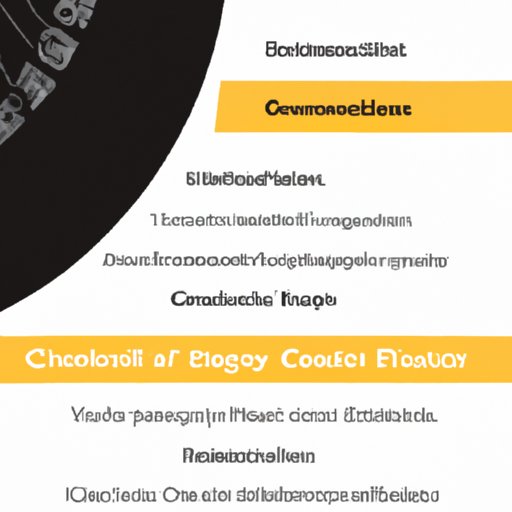Introduction
Forensic science is a field of science that uses scientific methods and techniques to investigate crimes. It involves collecting, analyzing, and interpreting evidence from a crime scene to help law enforcement determine who committed the crime. It is a multidisciplinary field that draws from many other sciences such as biology, chemistry, physics, and psychology. In this article, we will explore what you study in forensic science, including an overview of the different fields, core concepts, career opportunities, current trends, and how to compare and contrast the different disciplines.
Exploring the Different Fields of Forensic Science
Forensic science is divided into several different disciplines, each with its own set of skills and knowledge. The most common fields of forensic science are criminalistics, forensic pathology, toxicology, psychology, and digital forensics.
Criminalistics is the branch of forensic science that focuses on the collection and analysis of physical evidence. This includes fingerprinting, ballistics, handwriting analysis, and trace evidence. Criminalists also use DNA analysis to identify suspects and analyze blood spatter patterns to determine the sequence of events at a crime scene.
Forensic Pathology is the study of how diseases and injuries affect the human body. Forensic pathologists examine bodies during autopsies to determine the cause of death and provide expert testimony in court cases. They also collect and analyze tissue samples for toxicological testing.
Toxicology is the study of the effects of drugs and poisons on the body. Toxicologists analyze blood, urine, and tissue samples to detect the presence of drugs or poisons in a person’s system. They also provide expert testimony in court cases related to drug or poison-related deaths.
Psychology is the study of the human mind and behavior. Forensic psychologists work with law enforcement to profile criminals and assess their mental state. They also evaluate witnesses and victims to determine the credibility of their statements.
Digital Forensics is the study of electronic devices and systems. Digital forensics experts analyze computers, cell phones, and other electronic devices to uncover evidence of a crime. They also investigate cybercrime and use computer software to reconstruct deleted or damaged data.

Examining the Core Concepts of Forensic Science
In order to understand the basics of forensic science, it is important to be familiar with three main concepts: evidence collection, laboratory analysis, and expert testimony.
Evidence Collection is the process of gathering and preserving evidence from a crime scene. Evidence can include fingerprints, blood samples, fibers, weapons, and other physical items. Evidence must be collected, documented, and stored properly in order to be admissible in court.
Laboratory Analysis is the process of examining evidence in a laboratory setting. Evidence is analyzed using various scientific methods such as chromatography, spectroscopy, and DNA profiling. The results of the analysis are used to identify suspects and link them to a crime.
Expert Testimony is the process of presenting evidence and opinion to a court of law. Forensic scientists provide expert testimony by explaining the significance of evidence and testifying as to their findings. Expert testimony is essential in helping judges and juries reach a verdict.
Investigating the Career Opportunities in Forensic Science
Forensic science provides a wide range of career opportunities in law enforcement, education, and research.
Law Enforcement is the most common career path for forensic scientists. Forensic scientists work closely with law enforcement agencies to investigate and solve crimes. They analyze evidence, interview witnesses, and present their findings in court.
Education is another popular career path for forensic scientists. Forensic scientists often teach courses in forensic science, criminal justice, and related fields at universities and colleges. They also conduct research and publish papers in peer-reviewed journals.
Research is also an important part of forensic science. Forensic scientists conduct research to develop new methods of evidence collection, analysis, and interpretation. They also develop new technologies and techniques to improve the accuracy and efficiency of forensic investigations.

Analyzing the Current Trends and Developments in Forensic Science
Forensic science is constantly evolving as new technologies and techniques are developed. There are several current trends and developments in the field that are worth noting.
Advances in Technology have revolutionized the field of forensic science. New technologies such as DNA testing, facial recognition software, and 3D imaging have made it easier for forensic scientists to collect and analyze evidence. These technologies have also improved the accuracy and speed of investigations.
Developments in DNA Testing have also had a major impact on forensic science. DNA testing is now commonly used to identify suspects, match evidence to a crime scene, and exonerate the wrongfully convicted. DNA testing has become an integral part of modern forensic investigations.

Comparing and Contrasting the Different Disciplines in Forensic Science
The different disciplines in forensic science have their own unique sets of skills and knowledge. It is important to understand how they differ in order to choose the right career path.
Criminalistics vs. Forensic Pathology Criminalistics focuses on the collection and analysis of physical evidence, while forensic pathology focuses on the examination of bodies to determine the cause of death. Both disciplines require a deep understanding of biology, chemistry, physiology, and anatomy.
Toxicology vs. Psychology Toxicology is the study of drugs and poisons, while psychology is the study of the human mind and behavior. Toxicologists analyze biological samples to detect the presence of drugs or poisons, while psychologists work with law enforcement to profile criminals and assess the mental state of witnesses and victims.
Digital Forensics vs. Traditional Forensics Digital forensics is the study of electronic devices and systems, while traditional forensics is the study of physical evidence. Digital forensics experts analyze computers, cell phones, and other electronic devices to uncover evidence of a crime, while traditional forensics experts focus on fingerprints, ballistics, handwriting analysis, and other physical evidence.
Conclusion
Forensic science is a complex and ever-evolving field of science. It involves the collection and analysis of physical evidence from a crime scene, as well as the examination of bodies, toxicological tests, psychological assessments, and digital forensics. It is important for forensic scientists to stay up to date on the latest trends and developments in the field in order to remain effective in their investigations. With the right education and training, forensic scientists can pursue rewarding careers in law enforcement, education, and research.
(Note: Is this article not meeting your expectations? Do you have knowledge or insights to share? Unlock new opportunities and expand your reach by joining our authors team. Click Registration to join us and share your expertise with our readers.)
